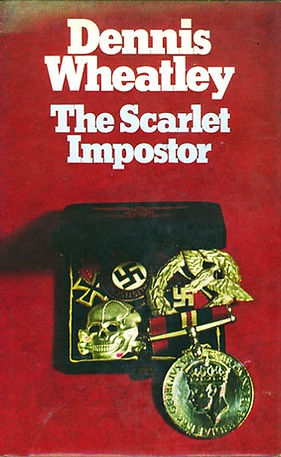Dennis Wheatley is a man hopelessly outdated yet he doesn’t deserve to be. He was one of those unfortunate souls who served in both world wars; in the trenches of WWI, he was gassed and invalided; in WWII he was on the Joint Planning Staff of the War Cabinet—the only civilian to do so—and then was in Winston Churchill’s underground headquarters as a Wing Commander. Between the wars he ran the family’s very successful Wine Merchant business, until, at 35, he sold it and decided to become a writer. His first novel was reprinted seven times in seven weeks. He was extraordinarily prolific and 60-odd books, none of them short, usually 500 or so pages, seem to have been produced at a rate of about two a year. Mostly they are thrillers and adventure yarns, or else horror stories, or science fiction and occasionally weird blends of two or more genres.
His great skill, however, was action scenes, which he would describe in remarkable detail without losing the suspense. Few have such talent. In my copy of The Scarlet Imposer, the first Wheatley I read and possibly his best work, there is a sequence in which the hero hears the Nazi patrol enter the house, escapes onto the roof, fights off two of them on the tiles, drops on another on the ground, steals their motorcycle and escapes in a hail of bullets, but these few minutes of desperate tension are sustained for fully 17 pages—in close type in my copy—of non-stop nail biting action.
Along with his war yarns, which collectively offer a fair history of WWII, his other popular series concerned Satanism, with a team of good guys toiling voluminously to thwart the Devil’s works on earth. To the Devil—a Daughter is one of the best—the virgin must be rescued from the priestly manifestation of Lucifer. Later, he even tried to draw a link between the Nazis and the use of Dark Forces, which idea would eventually be exploited in the Indiana Jones movies.
A very promising title was his A Bill for the Use of a Body but of course it was as decent and proper as anything that worthy wrote. I read it anyway because my very battered copy was signed by the author. A young woman is captured by Japanese (the hero fails to rescue her) and eventually grows to a position of great power which she deploys to destroy her tormentors (including the hapless hero). Wheatley, thinking her a villain, had run out of his age.
In Sixty Days to Live, Wheatley took on the subject of the comet that collides with earth, which got me all fired up as such subjects do even to this day. The book was fine, although no match for George Pal’s 1951 movie When World’s Collide, which I saw at around this time. Since we were faced with nuclear disaster, a collision with another world seemed a far more romantic way to go. I looked at the stars and almost wished for it.
Denis Wheatley seemed a remarkable blend of Verne, Haggard, Poe, Stoker, Wells, Johns, Dumas and Doyle all muddled together, but all of it is firmly rooted in the days of the indomitable British Empire, and so very contemporary that it would have dated in ten years. More fashionable and specialist writers like Fleming and MacLean would soon displace him, but no one in all literature comes close to matching the breadth of his scope. He sold over 40 million books and not one reader was ever disappointed.
As I looked at him lying curled in the foetal position, whimpering pathetically, I could see the true hollowness of my victory. To defeat someone not worth defeating was defeat in itself. I wished that he had at least fought back a little. When we could stand his sobbing no longer, Stetch dragged him to his feet. Tears streaked the dirt on his face. His lips were blubbery and horrible. I wanted to like him or admire his bravery or something, but the best I could manage was pity. Ivan handed him his glasses and he fitted them slowly, with shaking hands.
“Well that was probably the weakest fight in the entire history of the school,” Stretch said in disgust.
“Shake and we’re quits?” I asked him. He nodded tragically.
I stepped forward and extended my hand… And that was when he threw the best straight right I have ever seen in my life.



